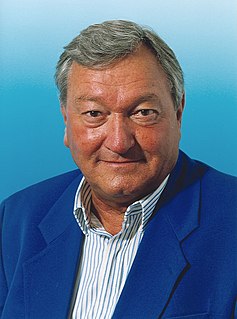A Quote by William Shakespeare
In peace there's nothing so becomes a man As modest stillness and humility: But when the blast of war blows in our ears, Then imitate the action of the tiger; Stiffen the sinews, summon up the blood, Disguise fair nature with hard-favour'd rage; Then lend the eye a terrible aspect; . . . . Now set the teeth and stretch the nostril wide, Hold hard the breath and bend up every spirit To his full height. On, on, you noblest English.
Related Quotes
So this is what I will do. I will gather together my past and look. I will see a thing that has already happened. the pain that cut my spirit loose. I will hold that pain in my hand until it becomes hard and shiny, more clear. And then my fierceness can come back, my golden side, my black side. I will use this sharp pain to penetrate my daughter's tough skin and cut her tiger spirit loose. She will fight me, because this is the nature of two tigers. But I will win and giver her my spirit, because this is the way a mother loves her daughter.
In reality, there is, perhaps, no one of our natural passions so hard to subdue as pride. Disguise it, struggle with it, beat it down, stifle it, mortify it as much as one pleases, it is still alive, and will every now and then peep out and show itself; you will see it, perhaps, often in this history; for, even if I could conceive that I had completely overcome it, I should probably be proud of my humility.
If we want to set out on the aruous search for the truth, we must all summon up the courage to leave the lines along which we have thought until now and as the first step begin to doubt everything that we previously accepted as correct and true. Can we still afford to close our eyes and stop up our ears because new ideas are supposed to be heretical and absurd?
The amount of preparation I saw from someone like [David] Fincher, and how aware he is of everybody else's job on the set, and how much respect he has for every aspect of the film, and every aspect of the frame - that's the type of actor I am now; it's not the type of actor I was then. But without understanding his process, and then coming to learn it later on, I would never be the actor I am now.
A lot of people will think I changed the book: ‘so you’re the tiger instead, you’re the tiger who ate the cook.’ That’d be totally expository, like in the book, ‘you’re the tiger’ and then it stops there. That seems to have the magic touch. I bring everything together. That’s why he made up the story, the whole thing becomes internalized. That might be the magic, but all I did is not so much interpreted, but try my best to keep everybody still staying in the movie. And I was like, ‘God, it’s so hard to do.’ I make movies for a long time. It doesn't get easier.
... these three witnesses are one, as John said: 'The water, the blood, and the Spirit' (I Jn. 5:8). One in the mystery, not in nature. The water, then, is a witness of burial, the blood is a witness of death, the Spirit is a witness of life. If, then, there be any grace in the water, it is not from the nature of water, but from the presence of the Holy Spirit.
Pride looks back upon its past deeds, and calculating with nicety what it has done, it commits itself to rest; whereas humility looks to that which is before, and discovering how much ground remains to be trodden, it is active and vigilant. Having gained one height, pride looks down with complacency on that which is beneath it; humility looks up to a higher and yet higher elevation. The one keeps us on this earth, which is congenial to its nature; the other directs our eye, and tends to lift us up to heaven.
Of course, you have politics, the Vietnam war and all that monkey business. There are all kinds of reasons. At every one of those demonstrations in the late Sixties about the Vietnam war, you could guarantee there'd be a series of speeches. The ostensible purpose was to protest the war. But then somebody came up and gave a black power speech, usually Black Muslims, then. And then you'd have a women's rights speech. It was terrible to listen to these things.




































